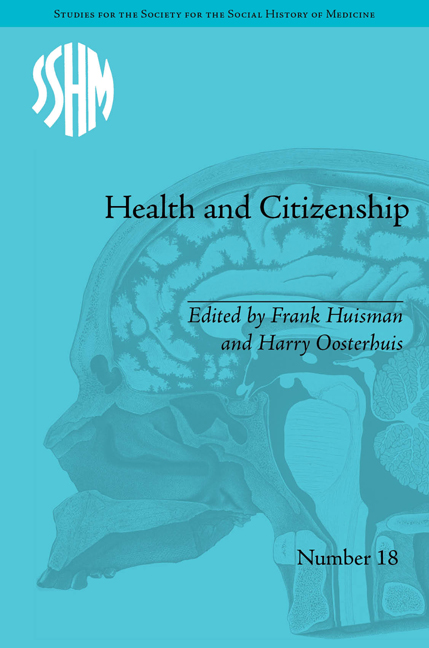Book contents
- Frontmatter
- CONTENTS
- Acknowledgements
- List of Contributors
- The Politics of Health and Citizenship: Historical and Contemporary Perspectives
- Part I Liberal Citizenship and Public Health
- Part II Social Citizenship: Health in the Welfare State
- Part III Neo-Republican Citizenship: Health in the Risk Society
- 8 Neo-Republican Citizenship and the British National Health Service since 1979
- 9 Struggling with Science and Democracy: Public Health and Citizenship in the Netherlands
- 10 Underwriting Citizenship: The Introduction of Predictive Medicine in Private Insurance
- Notes
- Index
9 - Struggling with Science and Democracy: Public Health and Citizenship in the Netherlands
from Part III - Neo-Republican Citizenship: Health in the Risk Society
- Frontmatter
- CONTENTS
- Acknowledgements
- List of Contributors
- The Politics of Health and Citizenship: Historical and Contemporary Perspectives
- Part I Liberal Citizenship and Public Health
- Part II Social Citizenship: Health in the Welfare State
- Part III Neo-Republican Citizenship: Health in the Risk Society
- 8 Neo-Republican Citizenship and the British National Health Service since 1979
- 9 Struggling with Science and Democracy: Public Health and Citizenship in the Netherlands
- 10 Underwriting Citizenship: The Introduction of Predictive Medicine in Private Insurance
- Notes
- Index
Summary
Public health appears to be intrinsically connected to the public domain and hence is expected to do justice to and to stimulate notions of citizenship, yet the meaning of citizenship in public health is problematic. In this chapter, I analyse the relation between public health and citizenship by drawing from political philosophy, sociology and science and technology studies. I will show that – especially the last decades in the twentieth century – relations between public health, science, politics and society have become captured in a rationalistic technocratic style. This implies that, while in society at large processes of democratization are intensified, in public health citizens are constructed more as the object than the subject of policies and interventions. As public health in the last decades of the twentieth century developed primarily as a technocratic practice, so the meaning of public health as a practice of democratic citizenship became limited.
In the introduction to this volume different ideals and practices of citizenship are distinguished, with different balances between freedom and equality, rights and duties, inclusion and exclusion, uniformity and diversity, autonomy and communion. While the nineteenth century is characterized by the editors in terms of liberal-democratic citizenship because of the strivings for political rights of the lower social classes and women, the twentieth century is characterized by the rise of social-liberal and social-democratic citizenship that combines political rights and specific welfare entitlements.
- Type
- Chapter
- Information
- Health and CitizenshipPolitical Cultures of Health in Modern Europe, pp. 191 - 208Publisher: Pickering & ChattoFirst published in: 2014



